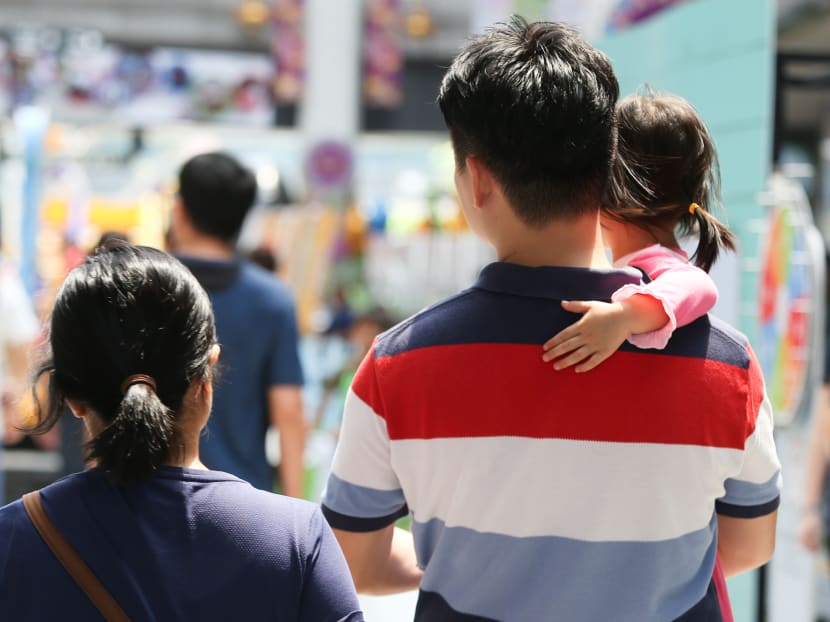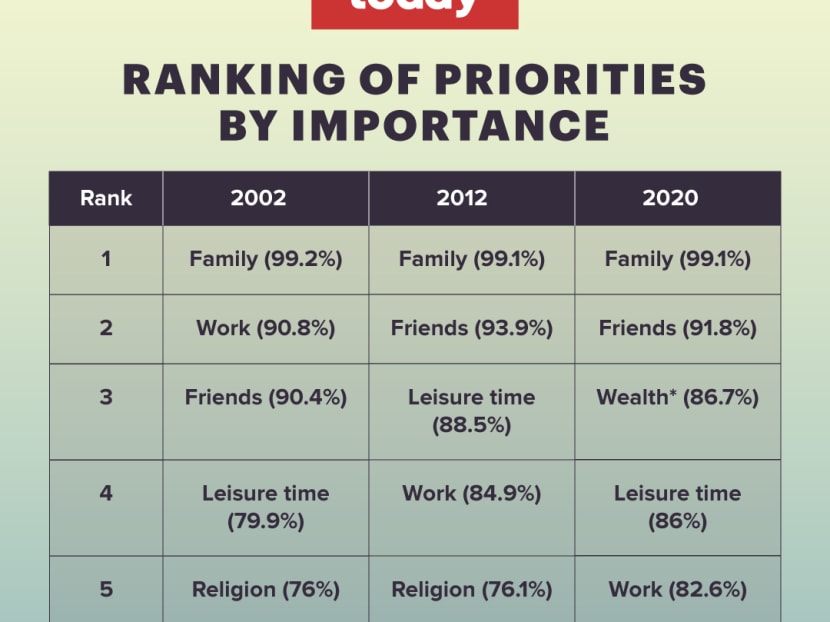Family still top priority for Singaporeans, but importance of work has declined since 2002: IPS study
SINGAPORE — Singaporeans continue to regard family as the most important facet of their lives, but the importance they place on work has dropped since 2002, a new study has found.

While family ranked consistently as Singaporeans’ top priority in the last two studies, work — which was deemed as the second most important in 2002 — dropped to fourth in the 2012 study and fifth in the latest study.
- As part of the global World Values Survey, researchers from IPS asked Singaporeans for their views on issues such as politics and their attitudes towards work and family
- The study found family has remained Singaporeans’ top priority
- Work has declined from being second in priority in 2002 to fifth in 2020
- Religion and politics remain Singaporeans’ lowest priorities
SINGAPORE — Singaporeans continue to regard family as the most important facet of their lives, but the importance they place on work has dropped since 2002, a new study has found.
This stands in contrast to people from elsewhere in Asia, with Malaysians, Thais, Taiwanese and the Chinese much more likely to prioritise work.
Meanwhile, religion and politics remain Singaporeans’ lowest priorities, according to the study done by researchers from the Institute of Policy Studies (IPS).
The study, titled “Our Singaporean Values”, is part of the 2020 instalment of the global World Values Survey, which takes in 80 countries and studies the changing values of individuals and their impact on social and political life.
The survey asks people in the various countries about their thoughts on a range of issues, including politics, their attitudes towards work, family and gender equality.
Singapore had previously participated in the 2012 and 2002 iterations of the poll which is conducted every five years. Singapore has taken part every decade since 2002.
The latest study includes responses from 2,012 Singaporeans in a nationally-representative sample. Interviews were conducted face-to-face from November 2019 to March last year.
WORK DECLINES IN PRIORITY
According to the study, Singaporeans ranked family, friends and wealth as their top three priorities. This was followed by leisure, work and religion, with politics rounding up the bottom.
While family ranked consistently as Singaporeans’ top priority in the last two studies, work — which was deemed as the second most important in 2002 — dropped to fourth in the 2012 study and fifth in the latest study.
In contrast, work came in as second in priority after family for Malaysians, Thais and Taiwanese.
The Singapore study findings also differed by age, education and socio-economic status.
Middle-aged respondents, for instance, were more likely to deem work as important compared to their older and younger counterparts.
While work was ranked third for those in the 36 to 50 age bracket, it was ranked as fourth for those aged 21 to 35 and sixth for those above 65.
Respondents with below-secondary level qualifications were also more likely to view work as less important relative to their better-educated peers.
For instance, work was ranked sixth in their list of priorities compared to third for diploma holders and fifth for those with a bachelor’s degree or higher.

In addition, a larger proportion of those aged above 65 indicated religion as a priority, likely because many in this age group have retired from full-time work, said the researchers.
Respondents residing in smaller, one to four-room Housing and Development Board (HDB) flats were more likely to view wealth as more important than leisure time.
This was the reverse for those living in five-room or larger HDB flats and private housing.
The difference in views among respondents of different socio-economic backgrounds likely reflects the differences in existing financial resources available to individuals, said the researchers.
STUDY FINDINGS
The study also provided a snapshot of how different demographics viewed different priorities such as family and work.
Family:
Over 90 per cent of married respondents considered family as “very important” compared to around 85 per cent of singles or divorcees
While over 90 per cent of those aged between 21 and 65 indicated family as very important, only 88.6 per cent of those aged above 65 did so
Muslims (97.1 per cent), Catholics (96.0 per cent) and Hindus (95.5 per cent) were also the top three religious groups to indicate family as very important
The study also noted a strong sense of filial piety among Singaporeans, with 86.2 per cent agreeing or strongly agreeing that one of their main goals in life was to make their parents proud
These levels of agreement are among the highest globally, although Singapore lags behind Malaysia, where 95.6 per cent of respondents indicated so
Friends:
Over half of the youngest respondents, aged between 21 and 35, indicated that friends were “very important” compared to just over a third for those in other age groups
Just under half of single respondents indicated that friends were "very important" in their lives. This was higher than married or divorced respondents
Those with higher socio-economic backgrounds were more likely to rate friends as “very important” in their lives
This was possibly because less well-off individuals may be focused on working and amassing wealth, affecting the time they spend on other aspects of their life, such as friendships, said the researchers
Wealth:
When it came to money, those in the oldest cohort gave it less priority, with a fifth of those aged above 65 indicating that it is not very important, or not important at all
In contrast, less than 13 per cent of those aged between 21 and 65 said the same
The study also found that those with a higher socio-economic status were “far less likely” to feel that wealth is important to them, compared to their less well-off peers
Only 20 per cent of those living in private property indicated wealth as a “very important” priority. In contrast, nearly 40 per cent of those living in one- to three-room HDB flats felt the same
Work:
Men (41.5 per cent) were more likely to view work as “very important” compared to women (31.7 per cent)
About 70 per cent of students felt that work is “rather important”, possibly because they aimed for gainful employment after graduation, noted the researchers
Those aged between 36 and 50 placed work as a higher priority among other age groups. This was likely because they were gainfully employed and had family responsibilities to shoulder, said the study
Leisure Time:
Younger and single respondents were most likely to rate leisure time as very important, although this erodes with marriage and ageing, said the researchers
About 40 per cent of those aged between 21 and 35 said leisure time was very important, compared to about 20 per cent of those above 65
Nearly 40 per cent of singles rated leisure time as very important, compared to less than 30 per cent of married respondents
Respondents from a higher socio-economic status were also more likely to indicate that leisure time is “very important” in their lives relative to their less well-off peers
Religion:
About 70 per cent of women viewed religion as very or rather important, nearly 10 percentage points more than male respondents
The youngest age cohort of 21 to 35 had the lowest proportion (56.8 per cent) of respondents who viewed religion as important, compared to those above 65 (72.9 per cent)
Muslims (77.8 per cent), Christian Protestants (62 per cent) and Catholics (50 per cent) were likely to indicate religion as very important in their lives
In contrast, less than 10 per cent of Taoists or those with traditional Chinese beliefs felt the same








